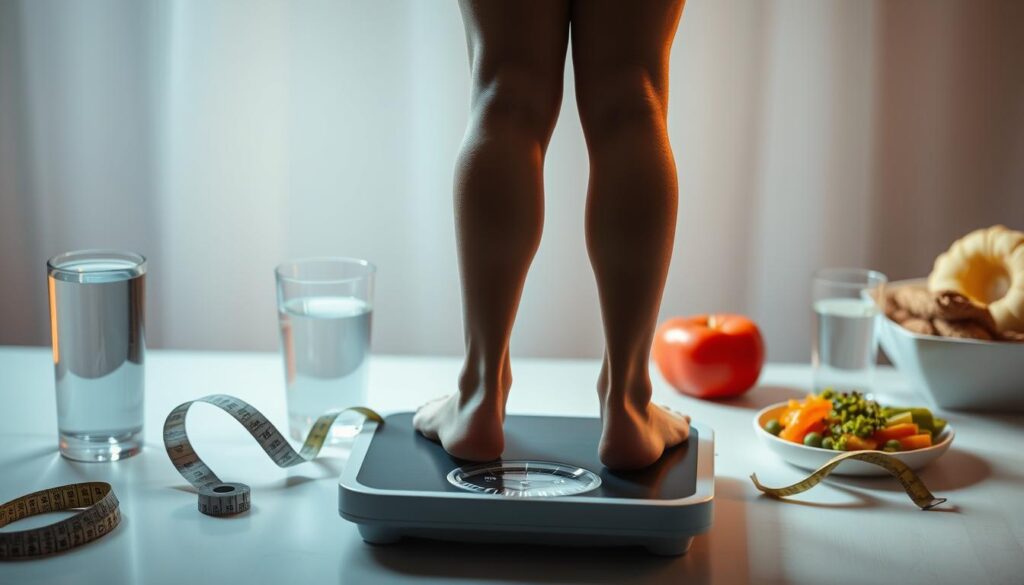About 70% of Americans are trying to lose weight. It’s a big deal for public health. To lose weight, you need to change your diet, move more, and sometimes get medical help. First, set goals you can reach and learn about your body’s metabolism.
Many people start losing weight for health, looks, or more energy. Losing weight is more than just diet and exercise. It’s about changing your lifestyle for better health and keeping a healthy weight.
Starting a weight loss journey takes time, effort, and the right plan. Knowing how weight loss works helps you succeed and reach your goals.
Introduction to Weight Loss
Key Takeaways
- Weight loss involves a combination of dietary changes, increased physical activity, and sometimes, medical interventions.
- Understanding the body’s metabolism is key for effective weight loss strategies.
- Setting realistic goals is vital for a successful weight loss journey.
- Lifestyle changes that promote overall well-being are important for maintaining weight loss.
- A complete approach to weight loss includes diet, exercise, and lifestyle changes.
- Patience and dedication are needed to achieve weight loss goals and lose weight.
Understanding Weight Loss: The Basics
Weight loss is a complex process. It involves burning more calories than you eat. This can be done by eating healthy and exercising regularly. A good diet plan includes foods like fruits, veggies, whole grains, and lean proteins.
People lose weight for many reasons. It could be for health, personal goals, or to feel better. Knowing how weight loss works helps you make better health choices. Eating right and exercising can help you reach your weight loss goals.
- Creating a caloric deficit through a combination of diet and exercise
- Focusing on nutrient-dense foods for healthy eating
- Staying hydrated and getting enough sleep
- Being consistent and patient with the weight loss process
Understanding weight loss basics and adopting healthy habits can help you reach your goals. A balanced diet and regular exercise create a healthy relationship with food and your body.
The Science Behind Weight Loss
Weight loss is a complex process that involves many factors. These include a caloric deficit, metabolism, and hormonal balance. To lose weight, it’s key to understand how these factors work together.
Regular exercise and a healthy diet are vital for creating a caloric deficit. This deficit is necessary for weight loss. By adding physical activity, like fitness routines, to your daily life, you can burn more energy. This supports your weight loss journey.
Metabolism is a big part of weight loss. It determines how well your body burns calories. Genetics, age, and muscle mass can affect your metabolism. Hormones like leptin and ghrelin also play a role in hunger and fullness.
By knowing these factors and adding regular exercise and healthy eating, you can boost your weight loss. This improves your overall fitness.
- Creating a caloric deficit through reduced caloric intake or increased energy expenditure
- Incorporating regular exercise and physical activity to support weight loss
- Understanding and managing hormonal balance to regulate hunger and satiety
By focusing on these key areas and adopting a complete weight loss plan, you can reach your goals. This leads to a healthy and fit lifestyle.
Types of Weight Loss
There are many ways to manage weight and live a healthier life. Weight loss can be split into different types, each with its own benefits. Knowing these types helps people make better choices for their weight journey. The goal is to make lasting lifestyle changes that boost overall health.
It’s important to understand the difference between losing fat and losing muscle. Losing fat is often the main goal, but keeping muscle is key for a healthy metabolism. A balanced diet and regular exercise are key to losing weight in a healthy way.
Fat Loss vs. Muscle Loss
- Fat loss: This type of weight loss involves reducing body fat, which can be achieved through a combination of diet and exercise.
- Muscle loss: This type of weight loss involves losing muscle mass, which can be detrimental to overall health and metabolism.
Sustainable vs. Rapid Weight Loss
Sustainable weight loss is better because it’s gradual and less likely to lead to weight gain back. Quick weight loss methods might work fast but can be risky for your health. Choosing sustainable weight loss methods leads to lasting success and better health.
The secret to successful weight management is finding a balance between eating right and exercising. By making lasting lifestyle changes and focusing on long-term weight loss, people can reach their goals and feel better overall.
Factors Influencing Weight Loss
Many things affect how we lose weight and change our body. Knowing these factors is key to a good weight loss plan. Things like genetics, age, and health play big roles.
Genetics can change how our body works, making weight loss harder for some. Research shows genetics can be up to 50% of why weight loss varies. As we get older, our muscle and metabolism slow down, making it tougher to lose weight.
Lifestyle and where we live also matter. A sedentary life or eating too much processed food makes losing weight harder. But, regular exercise and a healthy diet can help a lot.
- Genetic predispositions
- Age-related changes
- Lifestyle and environment
Knowing these factors helps us make a plan that fits us. This makes losing weight more effective and keeps us healthy. It leads to a better body and overall health.
The Role of Diet in Weight Loss
Diet is key in weight loss, giving the body nutrients and helping it burn more calories. A good diet plan is vital for reaching weight loss goals. With many diets out there, finding the right one is important.
Healthy eating isn’t just about avoiding certain foods. It’s also about getting all the nutrients your body needs. Eating a variety of fruits, veggies, whole grains, and lean proteins is a good start for losing weight.
There are many diet plans like low-carb, vegan, and portion control diets. Each has its own rules and restrictions. It’s important to pick one that fits your lifestyle and needs. By adopting healthy eating habits, you can boost your chances of losing weight successfully.
Popular Diet Plans
- Low-carb diets: restrict the intake of carbohydrates, such as sugar, bread, and pasta
- Vegan diets: exclude all animal products, including meat, dairy, and eggs
- Portion control diets: focus on eating smaller, more frequent meals to control hunger and boost metabolism
Nutritional Balance
Getting nutritional balance is essential for weight loss. It makes sure your body gets all the nutrients it needs while burning calories. Eating whole, unprocessed foods gives your body the fuel it needs for weight loss and keeps you healthy.
Exercise and Weight Loss
Regular physical activity is key for losing weight. It increases energy use and builds muscle. Exercise burns calories and boosts fitness levels. Different exercise types work for different people, based on what they like and want to achieve.
Popular exercise types for losing weight include cardio, strength training, and HIIT. These can be part of a daily routine, alone or together. For instance:
- Cardio like running or cycling burns calories and boosts heart health
- Strength training, like weightlifting, builds muscle and raises metabolism
- HIIT, with intense exercise followed by rest, improves fitness and burns calories

Being consistent is important for exercise and weight loss. Regular activity keeps metabolism up and helps manage weight over time. By mixing different exercise types into your day and staying with it, you can reach your weight loss goals and get fitter.
Psychosocial Aspects of Weight Loss
Many people focus on diet and exercise for weight loss. But, the psychosocial aspects are just as key. A person’s motivation and mindset are vital for starting and keeping up with weight loss. Understanding your reasons and having support are essential for lasting changes.
Motivation and Mindset
Having a positive mindset is key to reaching weight loss goals. A motivated person is more likely to follow their weight loss plan. Ways to stay motivated include setting achievable goals, tracking your progress, and celebrating small wins.
Support Systems and Their Impact
A supportive network can make a big difference in weight loss. Family, friends, or professionals can offer encouragement and guidance. This makes it easier to adopt healthy habits.
Examples of support systems include:
- Joining a weight loss group
- Working with a registered dietitian or personal trainer
- Sharing goals and progress with a friend or family member
Common Weight Loss Myths
There are many myths about weight loss that can confuse and frustrate people. It’s important to know the truth to have a successful weight loss journey. This is true for slimming methods too. Knowing the facts can help you make better choices for your health and body, leading to a better body transformation.
Many believe that certain foods can speed up metabolism and help lose weight fast. But, this isn’t entirely true. While some foods might slightly boost metabolism, losing weight well requires a healthy diet and regular exercise. Also, losing weight too fast can cause you to lose muscle and slow down your metabolism.
Some think that low-fat or low-carb diets are the best for losing weight. But, the best diet is a balanced one that you can keep up with for a long time. A diet that’s too strict can make you feel deprived and might lead to overeating. Instead, focus on making healthy lifestyle changes, like moving more and eating a variety of whole foods. This can help you achieve a successful body transformation and slimming results.
Some common myths about weight loss include:
- Crash diets are effective for long-term weight loss
- Certain foods can “burn” fat
- Exercise alone is enough for weight loss
It’s key to know these myths and focus on making lasting lifestyle changes. These changes should improve your overall health and well-being, leading to a successfulbody transformationandslimmingresults.
Weight Loss Plateaus
Reaching a weight loss plateau can be really frustrating. You’ve been sticking to your diet and exercise plan, but nothing seems to be working. It’s important to know that plateaus are a normal part of losing weight. They can happen for many reasons, like your body getting used to the changes or not eating enough calories.
To get past a weight loss plateau, you need to look at your diet and exercise again. Maybe you need to move more or change how you eat. A balanced diet that focuses on healthy eating can help you break through the plateau and reach your weight loss goals.

- Reassessing your diet plan to ensure you’re meeting your nutritional needs
- Increasing your physical activity to boost your metabolism
- Seeking professional guidance to adjust your weight loss strategy
By using these strategies, you can get past the plateau and keep moving towards your goals. Always stick to your healthy eating habits and diet plan. And don’t hesitate to ask for help when you need it.
Long-Term Weight Management
For lasting weight control, adopting a healthy lifestyle is key. This means setting achievable goals and building good habits. Regular exercise and balanced eating are important. It’s also vital to track progress, not just by weight, but through other health signs too.
A good fitness plan is essential for keeping weight off. It should include cardio, strength training, and high-intensity workouts. Eating a diet full of whole foods, fruits, and veggies is also critical for staying healthy.
- Setting specific and achievable goals
- Creating a sustainable exercise routine
- Developing healthy eating habits
- Monitoring progress and making adjustments as needed
By focusing on overall health, you can lower disease risks and boost your life quality. Regular exercise and a balanced diet are key to a healthy life. They help manage weight and improve well-being in the long run.
Seeking Professional Help
For those who find it hard to lose weight, getting professional help is key. A healthcare provider can guide you with a personalized plan. This plan might include eating right and exercising regularly for lasting weight loss.
When to Consult a Healthcare Provider
Always talk to a healthcare provider before starting a weight loss program. They can check your health and suggest safe ways to lose weight. You might need to see a healthcare provider if you:
- Gain or lose a lot of weight
- Can’t lose weight even with diet and exercise
- Have health issues like diabetes or heart disease
Value of a Registered Dietitian
A registered dietitian is very important for weight management. They offer expert advice on food and meal planning. With their help, you can make a plan that fits your needs for lasting weight loss.
Technology and Weight Loss
In today’s world, technology is a big help in losing weight. There are many apps, tools, and devices that help us track our progress. They offer features to monitor habits and give personalized advice. These tools have changed how we work on slimming and body transformation.
Apps that count calories and activity trackers are very helpful. They give us feedback on how active we are and how well we sleep. This helps us see where we can do better and make changes. By using data, we can learn more about our bodies and reach our weight loss goals.
Technology will keep getting better for losing weight. We’ll see more personalized coaching and AI suggestions. The future of slimming and body transformation looks bright. By using these new tools, we can start a more informed and successful weight loss journey.
